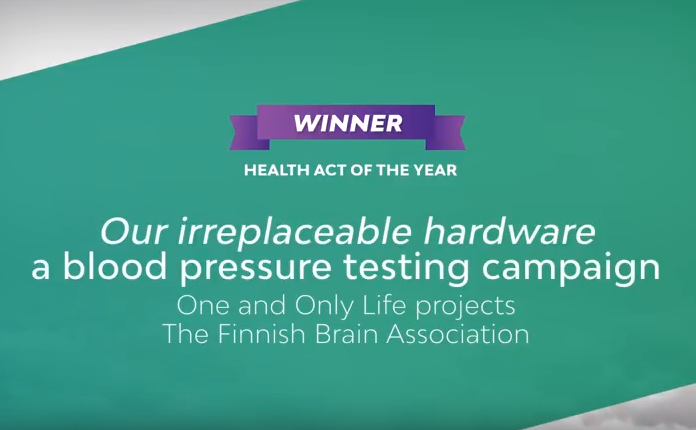
Jan 29, 2018
Tamro, Finland’s leading service provider and distributor of pharmaceuticals and health products, pronounced winners of The Health Awards 2018. The judges voted the Finnish Brain Association’s blood pressure campaign as the Health Act of the Year. Nightingale Health’s blood analysis for the prevention of cardiovascular diseases was selected as the Health Innovation of the Year. As stated on their website, with The Health Awards, Tamro rewards work that has effectively promoted the health of Finns, as well as brings promising innovations to the spotlight. Both winners received a prize of € 5 000. (more…)

Jan 29, 2018
IMPERIAL NEWS; by Ryan O’Hare, Imperial College London.
A new multi-million Euro initiative funded by the European Commission has been set up to help prevent stroke in patients with existing conditions
The €6.9m project is aimed at patients with atrial fibrillation (AF), a common heart condition which causes irregular and abnormally fast heartbeat, who have previously had a stroke caused by bleeding in the brain (termed intracerebral haemorrhage or ICH).
The Prevention of Stroke in intracerebral hermorrhage survivor with Atrial Fibrillation (PRESTIGE-AF) brings together scientists and clinicians across Europe with the goal of reducing the risk of further stroke in this group of patients. (more…)

Jan 26, 2018
The proportion of a rare type of stroke, called spontaneous subarachnoid hemorrhage or sSAH, is increasing among pregnant women, according to preliminary research presented at the American Stroke Association’s International Stroke Conference 2018, a world premier meeting dedicated to the science and treatment of cerebrovascular disease for researchers and clinicians.
Spontaneous SAH is an abnormality within the brain’s arteries that weaken and leads to ruptures in the blood vessels on the surface of the brain, causing bleeding between the membranes surrounding the brain. Spontaneous SAH refers to hemorrhage that occurs without trauma to the head or neck. (more…)

Jan 26, 2018
Fewer than one in 100 stroke survivors meet all of Life’s Simple 7 goals for ideal cardiovascular health identified by the American Heart Association. Moreover, the proportion who fail to meet almost all of the criteria is on the rise, according to preliminary research presented at the American Stroke Association’s International Stroke Conference 2018, a world premier meeting dedicated to the science and treatment of cerebrovascular disease for researchers and clinicians. (more…)

Jan 26, 2018
Study finds patients treated up to 16 hours after stroke showed positive outcomes
Advances in brain imaging can identify a greater number of stroke patients who can receive therapy later than previously believed, according to a new study. The results of the Endovascular Therapy Following Imaging Evaluation for the Ischemic Stroke (DEFUSE 3) trial, presented at the International Stroke Conference 2018 in Los Angeles and published on Jan. 24 in the New England Journal of Medicine, demonstrated that physically removing brain clots up to 16 hours after symptom onset in selected patients led to improved outcomes compared to standard medical therapy. The study was funded by the National Institute of Neurological Disorders and Stroke (NINDS), part of the National Institutes of Health. (more…)

Jan 24, 2018
The webinar, sheduled for Monday, January 29, 2018 5:00:00 PM CET – 6:00:00 PM CET, will kick-off the State of the Art on clinical data recently published in 2017 and discuss the next boundaries to foresee in Acute Ischemic Stroke treatment. (more…)

Jan 22, 2018
SAFE Working Conference in Zagreb 2017 gathered over one hundred delegates from all SAFE member organisations. Victoria Brewer, SSOFT Project and Operations Director, saw this conference as a great opportunity for collecting both stroke stories and some high value feedback from stroke survivors and other people who manage national stroke support organisations across Europe. As we wanted to hear more about SSOFT progress and development, we interviewed Victoria about her impressions from Zagreb and what would be the next steps. (more…)

Jan 19, 2018
A team lead by Sílvia Vilares Conde, from CEDOC-NOVA Medical School, in collaboration with the pharmaceutical company Galvani Bioelectronics, has demonstrated through findings in rats that is possible to restore insulin sensitivity and glucose homeostasis, by modulating electrically the carotid sinus nerve, the sensitive nerve that connects the carotid body with the brain. The study is published in Diabetologia, the journal of the European Association for the Study of Diabetes [EASD]. (more…)

Jan 19, 2018
A brain-machine interface that combines brain stimulation with a robotic device controlling hand movement increases the output of pathways connecting the brain and spinal cord, according to a study of healthy adults published in JNeurosci. This work could have implications for restoring function in stroke patients with hand paralysis. (more…)

Jan 19, 2018
Methods from optogenetics and machine learning should help improve treatment options for stroke patients. Researchers from Heidelberg University have developed a computer vision technique to analyse the changes in motor skills that result from targeted stimulation of healthy areas of the brain. Movements recorded with a video camera are automatically analysed to monitor the rehabilitation process and evaluate and adjust the optogenetic stimulation. Researchers from the Interdisciplinary Center for Scientific Computing (IWR) in Heidelberg worked with neurobiologists from Switzerland to develop the method. (more…)








